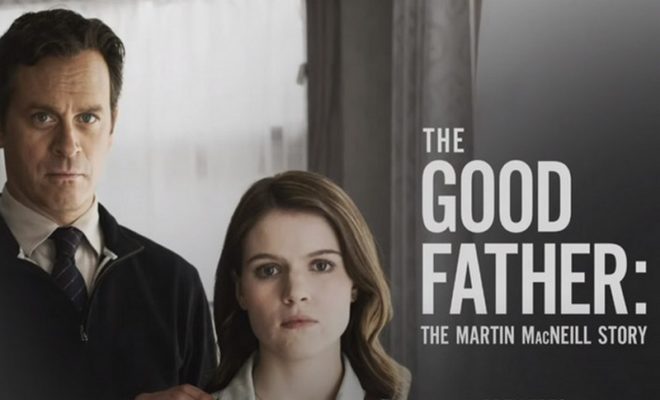
Interviews
Charisma Carpenter and Nancy Grace – The Good Father
By: Jamie Steinberg
Q) Nancy, a lot of what you’ve done in the TV-Movie realm, it seems like these are stories you’ve dealt with in other ways on your other programs in your other appearances. Is this one of those stories for you?
Nancy Grace: Well, yes as a matter of fact, it is. I covered the Martin MacNeill prosecution when it occurred. And felt that I became friends with various members of the family, specifically Alexis. I remember distinctly like yesterday –as a matter of fact we just showed the promo you just saw? It literally gave a chill on my arms because when I see that, it’s so realistic, it reminds me of the actual case. And I can still remember the night of the verdict and speaking with Alexis. And she was telling me about how she had gotten married her mother wasn’t there because her father murdered her mother and what that felt like, so this movie means a lot to me.
Q) When you talk about the chill that it gave you bringing back the real case, how are you on the set when a dramatization of a case you’ve actually covered is being done? I would imagine you want it to be as truthful to the fact as possible, yet it is still a dramatic movie. How are you with that?
Nancy Grace: Well, I will say that I went –I combed over the screenplay over and over and over. And, actually, pitched this to Lifetime with the intent of one day telling the true story of Dr. Martin MacNeill. But you know what? I don’t like calling it the Dr. Martin MacNeill story. I like calling it the Michelle MacNeill story because in my mind that’s the real star.
Q) Nancy, how involved was Martin’s daughter when it came to Anwen’s portrayal?
Nancy Grace: Oh wow, well her wishes and her desires were paramount in my mind. Because as I always like to say and I have said from the beginning of my TV career, these are not stories. They’re real. This is a real fact scenario with a real victim who died in the family’s bathtub. Her daughters –they had eight children, four natural, four adopted. They no idea what had really happened to their mother. So, when we talk about how much Alexis had to do with it, this is the telling of the story through her eyes. So, she had a lot to do with it. These are real characters. It’s not a made-up plot that someone came up with or dreamed up. This is real. And that makes it in my mind even more critical that it’s true to life.
Q) Charisma, what was it that initially drew you to the part?
Charisma Carpenter: Well, I think any time you mix true crime with scripted television, you do have to walk and extra careful line. It was super challenging to honor her memory and to be able to get across her love of family, to be able to get across the behaviors that she was experiencing and her confusion about his behavior, the pathological lying and the sociopathy behind it all. So, I feel like whenever you’re approaching a character, you have these insights that you bring to the table, but when it’s a real-life story, you have to take the insights that you understand from whatever the history is of the story. You have to do a lot of reading, a lot of research and then you know the importance of getting that across was a true challenge and something that I took to heart and wanted to pay the utmost of respect to. So that was a new thing for me.
Q) Nancy, how difficult is it to get life rights? You’ve taken to task a lot of ripped-from-the-headlines stories and getting the cooperation from the family and the estates, how difficult is that?
Nancy Grace: Well, since –being a crime victim myself, usually tell stories from the point of view of the crime victim. And I’ve never had any problem with their cooperation. Very often they want their story told and not just within the confines of the witness stand.
Q) Is it difficult for them to relive this all over again?
Nancy Grace: Yes, it is. It’s very difficult for them to relive it. I’ve had many, many crime victims that don’t want to talk about it. It brings it all back to them and including the pain that they went through. And that’s one thing about Alexis of many things that was so significant and so critical in this project because it did bring back a lot of sadness and a lot of emotion for her that she had to relive, but she did. And I’m so glad she did.
Charisma Carpenter: She was impressive in doing that. And also I think you know to add to that is Anwen, it being Alexis’s story portrayed by Anwen, it is a story of empowerment. It is a story of reclaiming your power and not allowing yourself to be manipulated and gaslighted any longer by this perpetrator that was unfortunately her own father who she admired and adored and loved and was well-respected.
Nancy Grace: Mm-hmm.
Charisma Carpenter: In the community and at work and within his church. So I mean what a powerful place, what an unfortunate thing to have to be confronted with, but then to understand the strength of character, her perseverance, her desire for truth to support her siblings while she was in medical school. I mean, this is an incredible person. This is an amazing woman. So, yeah, to be able to tell this story because it is in fact, Michelle, it may be her story in that sense, but it’s also a story of empowerment which I could really hold onto and clamp onto and why I also wanted to be involved.
Q) Nancy, what crime were you a victim of? And what are the qualities required for you to decide to take on a project?
Nancy Grace: People think I always wanted to be a violent crime prosecutor. That is not true. I studied Shakespearean literature and hoped to teach at a university level Shakespearean literature. That was my dream. My fiancé was murdered shortly before our wedding. I dropped out of school. I lost all interest in being in a classroom or in life, period. I ultimately did go back to school with the aim of becoming a felony prosecutor and helping other crime victims who I believe very often, especially women and children, do not have a voice in our system. This story, as I call it, although it is a true fact scenario, was especially poignant to me because not only were the victims women and children, it was at the hands of one of the most prominent men in that social setting, that community, a doctor and a lawyer who manipulated everyone as Charisma just said very accurately. And they had no voice, and it makes what Alexis did even more powerful bringing her own father to justice.
Q) So, when you decide on a project, what does it have to have for you to do it?
Nancy Grace: I’ve never liked –people often ask me, “What’s your favorite case?” There’s not really a favorite murder. I don’t know really how to put it in any other words. But I look for a story to be told, a narrative, not a case that’s open and shut. To turn a scenario like this into a movie, there must be mystery. The characters must be riveting to grab your attention. And I always think that it requires some sort of a mind twist. For instance, in that community, the last person anyone would suspect molestation or murder would be Dr. Martin MacNeill.
Q) Charisma, did you do any sort of special research or preparation before filming the role?
Charisma Carpenter: Well, I obviously read up about him and about the family story and the family history. You know, I had to get familiar with the story. I didn’t know the story personally, so this was an education.
Q) Nancy, I was wondering, do you know why in the movie there was never any mention made of the fact that they were Mormons, and they were in a Mormon community?
Nancy Grace: Well, honestly, that may be significant to some people, but we had so many miles to cover, and I don’t believe in my mind what religion it was that mattered. It mattered to me like in my religion, I’m a Methodist. And within a church, the Methodist Church, the Catholic Church, the synagogue, there are deacons or those people that are looked up to or revered, typically men. So whatever milieu you may be in, there are those people that are seemingly put up on a pedestal as he was, not only within his church community, the Church of Latter Day Saints, but within his medical community. I mean, he had been appointed by the governor to run a state facility. This guy was revered by everyone. Whether he was Mormon or a Methodist or a Catholic or Jewish doesn’t matter. He had the respect of everyone which made it so much more difficult for people to believe he would do this thing. I gotta tell you I remember sweating it out waiting on the jury verdict. And I was worried that people would fall for him and his con. Everybody else believed him, why wouldn’t a jury? I was worried.
Charisma Carpenter: You know, you brought up a good point, Nancy, too. The revere of the community and the medical community and his own family, you know, the police department, they didn’t take imperative steps to determine her cause of death. They took his word for it. Like he just said she had an accident, and they didn’t –because of who he was, they didn’t investigate further. So that’s a commentary on our society as a whole. You know, just because you are a prominent figure and it just seems unfathomable that you’d be capable of doing such a thing, it is imperative that people do their job and due diligence.
Nancy Grace: You said that so well. Because even in the initial police reports, do you know what Alexis had to do to even get the autopsy re-examined to just basically pry the police into believing this could have happened. They had to change the determination on that autopsy report. That’s like moving a mountain.
Charisma Carpenter: And also just the fact that the daughter was Alexis, played by Anwen. She was in her dad’s corner. It took a lot. She didn’t believe her own mom when her mom was trying to tell her things that things weren’t adding up and he was spending a lot of time away and he had all these suspicions. You know, it’s very common for women to be considered hysterical or paranoid or bitter or jealous or you know all these different things when you know our intuition is continually being gaslit and dismissed. And so it’s really important that we as a society do consider and trust the matriarchs of our lives and that we do re-evaluate no matter how high a standard you know our –you know, and this could go either way. You know I’m sure there are prominent women, too. But I don’t mean to make this anti-men, but to make a point that predominantly speaking, the patriarch is not questioned. And it is important that people be heard especially women.
Nancy Grace: You know what, Charisma? You just said a word that really rubbed me the wrong way.
Charisma Carpenter: What did I say?
Nancy Grace: If I hear one more woman referred to as hysterical, I’m going to shoot my foot.
Charisma Carpenter: I mean…
Nancy Grace: Because that’s exactly how they acted when Alexis tried to tell them her suspicions. They acted like she’s been through too much. She’s hysterical. She was anything but.
Charisma Carpenter: Mm-hmm. Yeah, it’s difficult to be dismissed that way especially when you’re a 100% right.
*CONFERENCE CALL*





You must be logged in to post a comment Login